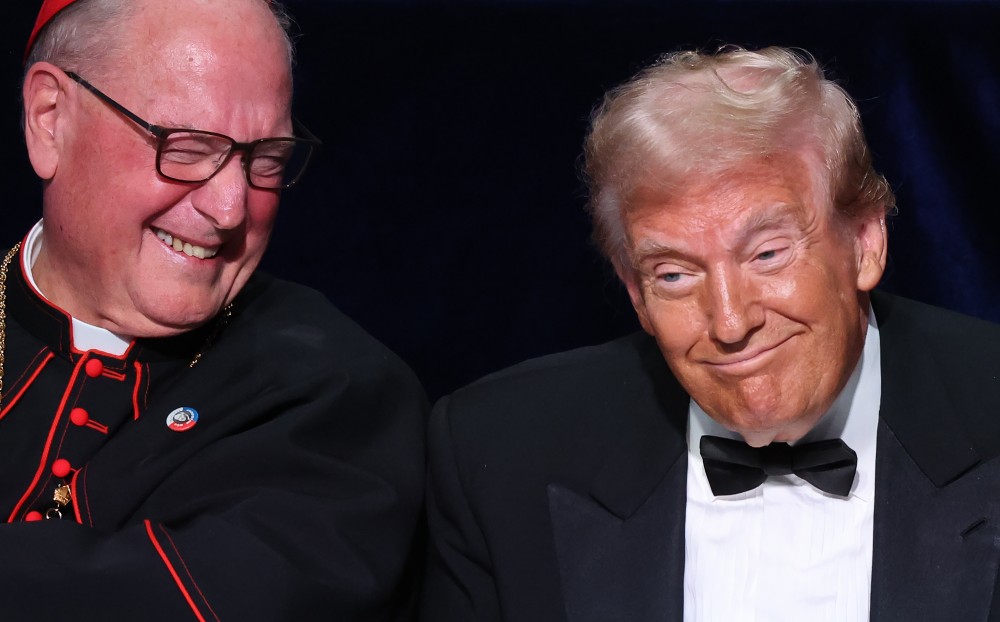
BALTIMORE — Commenting on the election of former President Donald Trump to serve a second term, Bishop Michael Burbidge of Arlington offered a reminder that no matter who occupies the White House, the Church’s advocacy and priorities will not change.
“No matter what the results were on Tuesday, the election, we knew on Wednesday something would be the same — that we are one nation under God,” Bishop Burbidge said. “No matter what happened on Tuesday, as pastors, we maintain that mandate to proclaim [and] celebrate the gospel of life, which is at the heart of protecting and defending all of you from the moment of conception to natural death.”
Bishop Burbidge, who is chairman of the United States Conference of Catholic Bishops Committee on Pro-Life Activities, made the comments at the bishops’ annual fall gathering in Baltimore, which takes place this year from Nov. 11-14. Like Bishop Burbidge, other remarks on the election during the Nov. 12 public session were measured — focusing on the Church’s advocacy priorities and role in society as opposed to Trump himself.
The only mention of the election from Cardinal Christophe Pierre, the apostolic nuncio to the United States, in comments to the American bishops, was to say that “we have been living through an intense election cycle, which has challenged us to give witness to the Gospel of peace in the midst of a political climate that seems kind of like a war.”
Meanwhile, Archbishop Timothy Broglio — in his address as USCCB president — highlighted the importance of proclaiming the gospel and bringing people together after the election.
“As the successors of the apostles and vicars of Christ in our dioceses, we never back-pedal or renounce the clear teaching of the Gospel,” said Archbishop Broglio, who also leads the Archdiocese for the Military Services, USA.
“We must insist on the dignity of the human person from womb to tomb, be unstinting in our commitment … to see Christ in those who are most in need,” he continued, “to defend and lift up the poor, and to encourage immigration reform, while we continue to care for those in need who cross our borders.”
“At the same time, we must encourage people to work together, to listen to each other, and in disagreement to never forget that the other is created in the image and likeness of God and is, therefore, worthy of respect,” he said. “We redouble our efforts to introduce civility into the everyday discourse.”
While Cardinal Pierre and Archbishop Broglio’s comments were made during the public session, Bishop Burbidge made his in a midday moderated discussion for journalists he participated in alongside Archbishop Broglio and Bishop Mark Seitz of El Paso, chairman of the USCCB Committee on Migration.
Comments from the three prelates on the election, for the most part, avoided Trump and his potential policies specifically and more so stuck to their roles as pastors to proclaim the gospel and bring people together.
Bishop Seitz and Archbishop Broglio, however, were at one point more straightforward when asked about Trump’s possible approach to immigration issues.
Asked about the possibility of mass deportations, Bishop Seitz said if that takes shape as a policy, the conference will “raise [its] voice loudly,” adding that how it unfolds will be a “test for our nation.”
“Are we, in fact, a nation based on law, on the most fundamental laws about the rights of the human person, or are we not?” Bishop Seitz asked. “And we don’t have ourselves a police force or an army or anything like that, but we are going to certainly do our best to express that, and then also accompany the people that are threatened with what ultimately would be unjust actions for some.”
Bishop Seitz acknowledged there are immigrants in the United States who have not respected the opportunity to enter the country and that the justice system needs to “act in appropriate ways” to address those who have been convicted of crimes.
Archbishop Brogli opined that mass deportations don’t seem “economically very sound” and on immigration in general, he said the conference hopes the new administration will take steps towards comprehensive immigration reform, as well as respect for the dignity of the human person.
“We certainly don’t encourage illegal immigration, but we certainly do take care of those who come to this country and really represent the face of Christ in their need,” Archbishop Broglio said. “So I think as we move forward, we hope there will be an earnest effort to repair the immigration law in this country, and also there will be a renewed respect for the dignity of the human person.”
Like Bishop Burbidge’s comment at the outset, his response to an all-encompassing question on possible disagreements the conference will have with the incoming Trump administration on abortion, In vitro fertilization, and immigration perhaps sums up the conference’s approach.
“We will, as we’ve always done with all administrations, continue to dialogue with our elected officials to take the opportunities to educate where we can have a respectful conversation,” Bishop Burbidge said. “But the mandate is the same and we will continue in those efforts.”
